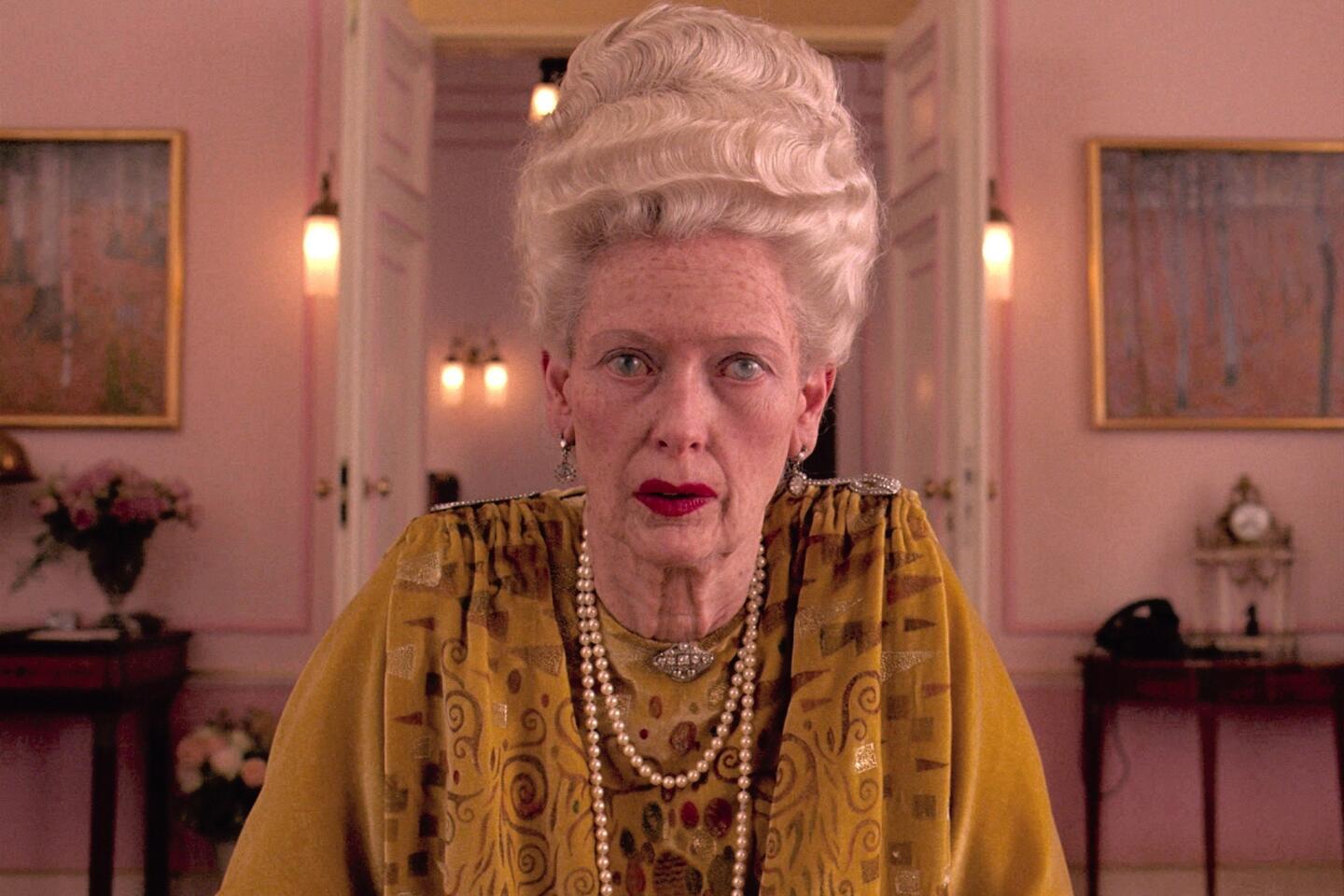The fantastical facial hair of ‘The Grand Budapest Hotel’
- Share via
As with Wes Anderson’s previous movies, there isn’t a detail overlooked or a hair out of place in “The Grand Budapest Hotel” -- no mean feat given the myriad mustaches and bumper crop of beards that careen across the screen (no more than three or four of the male characters in the entire film were clean shaven).
With last weekend’s wider release giving more people the opportunity to check into the Grand Budapest, we checked in with makeup, hair and prosthetics designer Frances Hannon to deconstruct the whisker wizardy, walk through the sculpting of tonsorial topiaries (incuding Jeff Goldblum’s epic Freudian facial fuzz) and discuss how her mother helped her age Tilda Swinton by three decades.
There is a lot of facial hair in the movie – and the styles range from the merest wisp of drawn-on pencil-thin mustaches to full-blown bird’s-nest beards. How did each character’s particular facial hair style come about?
When Wes and I first spoke – back in August or September of 2012 – he wanted me to ask everybody in the cast who could to grow anything they could. So I asked them to grow full beards and mustaches so that I could cut the shape in that Wes would want. Then Wes and I would get together with the actor – usually the night before they were to be on camera – and the three of us would discuss the references and inspirations and then we’d start cutting it and adjusting it. Bill [Murray] for example, came in and he had grown a full beard and this wonderful mustache that didn’t look anything like he did in the film. We went for the biggest one – you have to start big and then scale back.
Was there a specific inspiration behind Murray’s face-spanning walrus mustache?
It was pretty much based on the old, very big Germanic [mustaches]. We wanted to be as extreme as we could without going into the realm of caricature. The mustache should never overtake the overall look and I think Bill’s was about as big as you could go, and a step further would have taken it into caricature.
What about Jeff Goldblum’s beard? It looked almost as if had been parted at the chin – and he kind of had this whole Sigmund Freud vibe going on.
Freud was the exact reference we used -- well done for you to notice it straight away! It wasn’t because it was Freud in particular, though, it was a way of referencing that [1930s] period combined with what the actor had [to work with]. And I have to say, Jeff Goldblum’s beard was the most extraordinary beard I’ve ever come across – the natural coloring was absolutely extraordinary.
And Jeff took such exceptional care of it himself -- he trained and cared for his beard like it was his pet dog. He oiled it, massaged it, combed it constantly and twisted the ends. We had all the products for him to use – waxes and little mustache combs and brushes. And I noticed he ended up using his beard within his performance a bit as well.
Were there any particular products you found most helpful in sculpting and shaping the facial hair?
I used a lot of the Captain Fawcett mustache waxes and oils and another product that was super strong and good for mustache control -- and extreme hair control – was Paul Mitchell Firmstyle Extreme Thickening Glue.
That was particularly true for Ralph [Fiennes], who did grow his own. I have to say, as small and neat as his mustache was, it took a lot of time every day to keep it so precise and so overly put-together. It was literally done by the hair to make it perfect – darkening in a little bit that was too pale, or lightening darker bits and training it and trimming each hair into place every single day.
But not all of the facial hair was grown from scratch right? What percentage was real vs. prosthetic?
It was at least 50-50 – and it might be slightly more false than real. But what I thought was really lovely was that nobody could tell who had grown their own and who hadn’t.
And when it came to the few men in the movie without facial hair – a handful of army soldiers here and some monks on a mountaintop there – that wasn’t by accident either, was it?
There was a thought process, an overall look everything -- nothing on Wes’ films just happen. For example, the monks were holy men so they couldn’t be seen as preening. But they also shouldn’t be [seen as] paying so much attention that they’re completely clean shaven. So they had stubble.
Were there any surprises along the way?
The biggest surprise for me didn’t have anything to do with men’s facial hair – it was when Wes told me he wanted me to age Tilda [Swinton] from Tilda’s real age [of 53] to 83.
Was the distinctive look of Swinton’s Madame D. from anyone in particular?
Her look and her wonky lipstick I based on my mum – the way older ladies tend to put their lipstick on without using a mirror -- and that wonderful stacked-up hair. And my mum suffers from cataracts so I thought that would be another nice aging thing. You can do very small, little things with aging that make a huge difference – like the tiny precision of the mustache makes the big difference rather than a loud something or other.
What are you working on currently?
I just finished “Frankenstein” with Daniel Radcliffe and James McAvoy – which is a period piece – then I’m going off to do a contemporary film in Morocco with Bill Murray.
You have worked with both Bill Murray and Wes Anderson quite a lot, right?
Yes, I met [Bill Murray] working on a film in England maybe 20 years ago and have worked with him on and off ever since. And it’s thanks to Bill that I first met Wes Anderson on “Rushmore.” [She’s worked on Anderson’s “The Life Aquatic With Steve Zissou” – also with Murray – as well as Anderson’s “The Darjeeling Limited.”]
So, yes, as a result, life has brought many pleasures to my corner.
ALSO:
‘The Grand Budapest Hotel’ builds at the box office
‘American Hustle’ builds character from the scalp down
‘Maleficent’ merchandise ranges from $16 lipstick to $20K jewelry
More to Read
Only good movies
Get the Indie Focus newsletter, Mark Olsen's weekly guide to the world of cinema.
You may occasionally receive promotional content from the Los Angeles Times.












